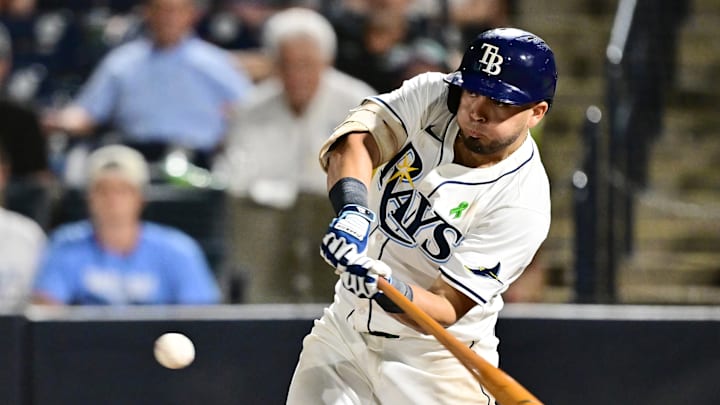The Tampa Bay Rays are stuck between a rock and a hard place right now. At 22-26, they're still in contention in a wide-open American League, but they already find themselves 6.5 games back of the division-leading Yankees.
As expected, the pitching staff has been a strong suit of the team this year, with the bullpen offering a steady presence at the end of games (Manuel Rodriguez, Garrett Cleavinger, and Pete Fairbanks have been brilliant in 2025), while their rotation has been refreshingly healthy.
However, the team's offense is once again lacking, as Josh Lowe (100), Yandy Diaz (102), and José Caballero (103) are the Rays' only above-average contributors according to wRC+.
Well, they're the only above-average contributors not named Jonathan Aranda. The 26-year-old is enjoying a breakout season, slashing .310/.396/.500 in 164 plate appearances through May 20.
His 162 wRC+ ranks ninth among all qualified hitters this season, in the company of superstars like Pete Alonso, Alex Bregman, and Fernando Tatis Jr. However, his 1.3 fWAR ranks outside the top 50 (52nd). What gives?
Jonathan Aranda's bat is lifting up poor defense, baserunning
Take a look at the top of those fWAR leaderboards again, and you'll start to get a sense of what separates stars from superstars in baseball.
Chicago Cubs center fielder Pete Crow-Armstrong is experiencing an offensive breakthrough this season — he's got a 143 wRC+ and is on pace for a 40/40 season — but he's second in baseball with 3.0 fWAR because he's the best defender in baseball and the second-best baserunner (at least according to FanGraphs).
It's true that FanGraphs' defensive calculations are a bit skewed — Shohei Ohtani is offering the Dodgers "negative" value on that side of the ball despite spending all 47 of his games this season at designated hitter — but the reason fWAR is a valuable metric is that is takes into account a player's relative performance in every area of the game.
Simply put, Aranda, who has 17th percentile sprint speed and offers average-at-best defense at first base, isn't a very good player outside of the batter's box.
That doesn't mean he isn't a valuable player. By fWAR, he's been the most valuable player on the Rays this season, and given their relative offensive incompetence, his contributions at the plate have been that much more valuable for Tampa Bay.
The point is that baseball is a game of multiple dimensions, and no matter how good a player is at any one skill, they have a finite ceiling if they aren't great at everything. The Rays certainly wouldn't trade Aranda's offensive output for better defense or baserunning this season, nor should they. A batter's most important job is to hit, after all.
But when you're looking at WAR or any other cumulative metric, remember that players are judged for the whole of their performance, and not just the part that's most important to their team.
